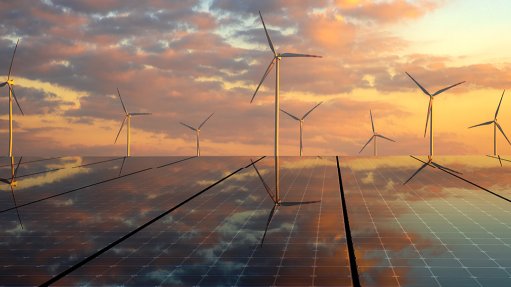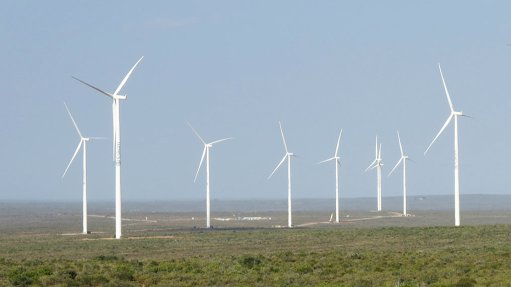On-The-Air (07/05/2021)
Every Friday, SAfm’s radio anchor Sakina Kamwendo speaks to Martin Creamer, publishing editor of Engineering News & Mining Weekly. Reported here is this Friday’s At the Coalface transcript:
Kamwendo: Gold Fields is spending R660-million on solar power at the big South Deep gold mine in Gauteng.
Creamer: Yes, Gauteng has got this massive mine South Deep. It is 3km underground, it is mechanised and it is going to be there when all the other mines cease, because it has got such a huge orebody. Now, they have set-up what looks like the first, but it's a big one, 40 MW of solar power. This covers 200 soccer fields.
You have got to have a lot of solar panels, 100 000 solar panels over more then 100 hectares. That will begin this quarter. They will start producing that. They have been waiting to produce solar energy for so long, because you can do it at a much cheaper way then getting the power from Eskom. It is also much cleaner, of course, and that is what the world is striving for at the moment. It will be a part of a whole clean-up and green-up of South Deep, because not only will they be looking at solar power, but they will be looking at cleaner ways of mining, making sure that diesel is not used underground to the same extent that it is. It will be part of a major greening of mining.
This is a starting point, this is the biggest we have had in South Africa at the moment. There are big ones coming up as well in future, but this is the starting point and they have been waiting for so long. We could have had this two years ago. The applications were in. In fact, they put applications in to Australia two years ago and those are already built. We could have had this done, so we are behind, but at least we are starting to catch up now with clean energy, at a time when the whole climate change is demanding that we go green.
Kamwendo: Strict new global rules now apply to mine dumps in a bid to ensure that they don’t kill any more people.
Creamer: We had 270 people killed in Brazil. Our own mines here we killed 17 people in 1994 when they woke up and was smother by slime coming into the 80 houses there that were destroyed. In Brazil, of course, 270 people, much bigger and far greater consequences. That firmed up the whole world and we see the United Nations Environmental Programme also going deeply into this, forcing the mining industry to come in and set-up new guidelines to make sure that when you build these tailings dams, that they are built in such a way that they can’t collapse.
What they are worried about also at the moment is that there is so many abandoned tailings dams. We call them mine dumps largely, but a lot of them are tailings dams. They still have quantities of water and we know that in 1994 in Virginia, in the Free State, in South Africa, when there was a thunder storm, in the early hours of the next morning, this wall burst and it flooded and destroyed all these houses and killed 17 people. We don’t want that sort of thing to happen again. We found afterwards that that particular tailings dam in Virginia, in the Free State, built by Harmony, was not built correctly. It did not have the proper at 45 degrees buttressing.
Now they are saying that they are laying down the guidelines, any tailings dam you build has to follow this. What is also being strived for is less waste on mines. So, they don’t actually want to have these tailings dams at all if possible. They are bringing in new technologies to make sure you can minimise the amount of mine waste that goes onto these dumps, because most of the time when you have these dumps, they have still got metals, gold, iron-ore in them. They want to reduce that to zero if possible, but in the meantime, if you build one now, you have got strict rules that you have to cover.
Kamwendo: South African and Ghanaian business locked arms this week in a welcome automotive deal.
Creamer: This is fantastic. We want Africans to do business with Africans. We are sick of this situation where so much gets imported and Africa relies particularly on Europe and all the other places that supply it. Now, we have got this company out in Nigel, in Gauteng it is our company, Supreme Spring.
They have signed a memorandum of understanding with Ghana’s Springs and Bolts, and they now work together. This should have been happening long time ago. Thank goodness the African Association of Automotive Manufactures brought these people together. They are hoping to bring many more people together, because Ghana is also very keen on assembling cars and vehicles there like we do here. We have got component parts that go into those vehicles when we assemble them. This will be some sort of team work now in Africa. We want Africans to do business with Africans. We need intra-Africa trade. Now, with this new free-trade agreement, a lot more is going to go into intra-Africa trade, because the way we will do business will be different. It will be more streamlined and a lot of the countries have already come into this agreement.
What great news this Nigel company, Supreme Spring, has tied up already with the Ghanaian company, also in the same sort of line of business. They will do things together, they will manufacture together and actually make sure a lot of the money that is generated in Africa stays in Africa and doesn’t leave and go into the rest of the world. When you import, you create jobs outside of Africa. We want to create our jobs inside of Africa, so well done to Supreme Spring of Nigel and then Springs and Bolts of Ghana.
Kamwendo: Thanks very much. Martin Creamer is publishing editor of Engineering News & Mining Weekly.
Article Enquiry
Email Article
Save Article
Feedback
To advertise email advertising@creamermedia.co.za or click here
Announcements
What's On
Subscribe to improve your user experience...
Option 1 (equivalent of R125 a month):
Receive a weekly copy of Creamer Media's Engineering News & Mining Weekly magazine
(print copy for those in South Africa and e-magazine for those outside of South Africa)
Receive daily email newsletters
Access to full search results
Access archive of magazine back copies
Access to Projects in Progress
Access to ONE Research Report of your choice in PDF format
Option 2 (equivalent of R375 a month):
All benefits from Option 1
PLUS
Access to Creamer Media's Research Channel Africa for ALL Research Reports, in PDF format, on various industrial and mining sectors
including Electricity; Water; Energy Transition; Hydrogen; Roads, Rail and Ports; Coal; Gold; Platinum; Battery Metals; etc.
Already a subscriber?
Forgotten your password?
Receive weekly copy of Creamer Media's Engineering News & Mining Weekly magazine (print copy for those in South Africa and e-magazine for those outside of South Africa)
➕
Recieve daily email newsletters
➕
Access to full search results
➕
Access archive of magazine back copies
➕
Access to Projects in Progress
➕
Access to ONE Research Report of your choice in PDF format
RESEARCH CHANNEL AFRICA
R4500 (equivalent of R375 a month)
SUBSCRIBEAll benefits from Option 1
➕
Access to Creamer Media's Research Channel Africa for ALL Research Reports on various industrial and mining sectors, in PDF format, including on:
Electricity
➕
Water
➕
Energy Transition
➕
Hydrogen
➕
Roads, Rail and Ports
➕
Coal
➕
Gold
➕
Platinum
➕
Battery Metals
➕
etc.
Receive all benefits from Option 1 or Option 2 delivered to numerous people at your company
➕
Multiple User names and Passwords for simultaneous log-ins
➕
Intranet integration access to all in your organisation



















